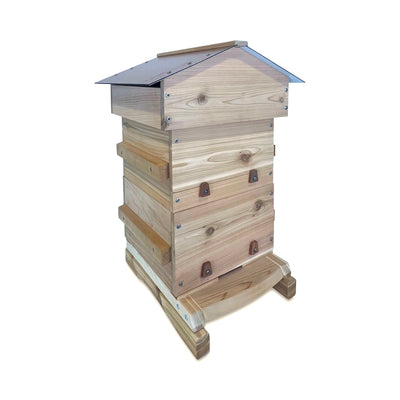Local Beekeeper Spotlight: Alexander Howitt
Here at Bee Thinking, we love connecting with local beekeepers and bee lovers right in our own community. We were thrilled when Alexander Howitt, owner of Portland’s One Twenty Apiculture, walked into our shop and introduced himself. We’re excited to carry Alexander’s raw, wildflower honey in our shop.
How long have you been a beekeeper?
I’ve been a beekeeper for a little over eight years. The first four of those years was for two different commercial beekeeping companies in New Zealand, which is where I’m from. I learned hard and fast from them during those years. I remember watching the beekeepers for a whole week before I was allowed to get into a beehive by myself. During that time I learned a lot of respect for beekeeping. I also learned a lot from the commercial beekeepers’ mistakes and shortcuts that they were taking. They were always harsher with the bees than I wanted to be, what with moving them around a lot and feeding them crappy sugar syrup. I learned that, when I started beekeeping myself, I wanted to do it completely differently.
After that, I traveled around Southeast Asia and worked with different small beekeeping organizations. And now I’ve been beekeeping here for two and a half years.
How did you initially get into beekeeping in the first place, with the commercial beekeeping companies?
A family friend asked me to come out and work there one summer when I was 16. The first week I got stung about 100 times, and I worked day and night moving bees around the east cape of the north island in New Zealand. I kind of fell in love with the craziness of it: the bee stings, the challenge, getting stuck in the mud and having to get out before the sun came up and the bees started flying. It was always really challenging and demanding of my body, and I kind of enjoyed that challenge.
And what made you move from New Zealand to Portland?
Well, my partner got relocated for work, so I kind of just got dragged along. *Laughs* It ended up being a good thing for both of us. I really enjoy Portland, it’s quite similar to New Zealand. People here like being outdoors: hiking, camping, barbequing, that sort of thing. I’m into all of that kind of stuff, too.
How many hives do you have now?
I have about 40 hives right now, scattered around Portland and all of Oregon, actually. I have a couple out on the coast in Manzanita, a couple over in North Portland, and then I have some pollinating an organic blueberry farm in Sherwood. Those are pollinating blueberries for Our Table Cooperative, and they sell blueberries to New Seasons Market, which is pretty cool.
All of the hives stay in their spot all year round. If I were to rent a hive for a certain period, I would then leave that hive there all year round so the hives only get moved once per year. Because I’m not capitalizing on pollination like a lot of the bigger guys are, I have to find another angle. I also do consults and sell local honey to get some more revenue.
All of my hives are 10-frame Langstroth, but I also help clients manage Top Bar and Warre hives, as well as some home-built hives.
What’s your favorite part about beekeeping?
My favorite part is the feeling I get every time I go beekeeping. I could be having the worst day or something else could be going on in my life and I can go beekeeping. Yes, it’s hard work and occasionally you get stung, but there’s something sort of meditative about it that just calms you down and resets you. Being around the sound of the bees and just being constantly in awe of their abilities, and what they can do as a collective colony, I think it’s really unique. They keep surprising me year after year and I keep getting more and more involved.

And then for my logo, there are three parts: There’s the zip code bubble from where it’s made, then the bee’s wings, and then the honey droplet. The logo was designed by Kyle Lindell, a local graphic designer. They’re printed locally as well, which is just another way I try to keep everything local. The honey is usually produced, extracted, and bottled on site or within that zip code. I’ll travel with my equipment to process the honey and ideally sell it in the zip code that it was produced in to keep it local and reduce the carbon footprint.
Shop his honey here






Leave a comment